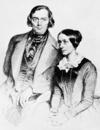- Schumann, Clara
-
orig. Clara Josephine Wieckborn Sept. 13, 1819, Leipzig, Saxonydied May 20, 1896, Frankfurt am Main, Ger.German pianist.Trained by her father, the noted piano teacher Friedrich Wieck (1785–1873), she debuted as a prodigy with Leipzig's Gewandhaus Orchestra in 1830, and then she toured for two years. By 1835 she had fallen in love with Robert Schumann, the Wiecks' boarder since 1830. When Clara turned 21 years old, they eloped against her father's wishes. Her artistic stature had already been established by her tours, but the birth of eight children limited her career, and she stopped writing music in 1853 after showing considerable promise as a composer. Robert's mental deterioration led to her resuming touring full-time; she retired from performing and teaching in the 1890s because of ill health. From 1853 she had a close lifelong relationship with Johannes Brahms.
 Robert and Clara Schumann, lithograph by J. HofelichThe Bettmann Archive
Robert and Clara Schumann, lithograph by J. HofelichThe Bettmann Archive* * *
▪ German pianistnée Clara Josephine Wieckborn Sept. 13, 1819, Leipzig, Saxony [Germany]died May 20, 1896, Frankfurt am Main, Ger.German pianist, composer, and wife of composer Robert Schumann.Encouraged by her father, she studied piano from the age of five and by 1835 had established a reputation throughout Europe as a child prodigy. In 1838 she was honoured by the Austrian court and also was elected to the prestigious Society of the Friends of Music (Gesellschaft der Musikfreunde) in Vienna.Despite strong objections from her father, she married Schumann in 1840, and they had eight children between 1841 and 1854. Though family responsibilities curtailed her career, she taught at the Leipzig Conservatory, composed, and toured frequently.Beginning in 1853 the Schumanns developed a close professional and personal friendship with the composer Johannes Brahms that Clara maintained after her husband's death in 1856. She edited the collected edition of her husband's works (published 1881–93). Her own compositions include works for orchestra (among them a piano concerto), chamber music, songs, and many character pieces for solo piano.* * *
Universalium. 2010.
